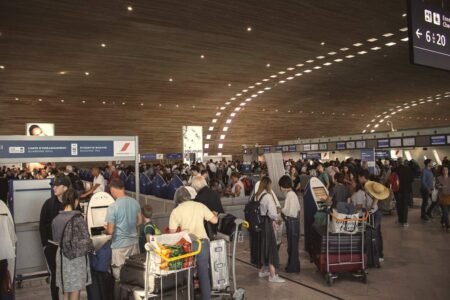Tourism relates to a wide range of areas, to name only a few: employment, regional development, education, environment, consumer protection, health, safety, new technology, transport, finance, taxation and culture.
Advertisement
The mission of the European Commission is to ensure interests of the tourism sector are taken into account; improve knowledge on tourism and contribute to the dissemination of information; and stimulate co-operation across the board.
Tourism is an activity which affects our society in many different ways and has a profound impact on our social, cultural and economic life. It relates to a wide range of areas, to name only a few: employment, regional development, education, environment, consumer protection, health, safety, new technology, transport, finance, taxation and culture.
The European Union still maintains its leading position in world tourism as a main source and and a main destination of international tourist flows. In 2000 five EU countries were among the 10 leading tourist destinations in the world, and in 1999 the EU accounted for 43% of arrivals and 40% of receipts in non-domestic world tourism. The importance of tourism is also shown by the amounts of expenditure and receipts that are transferred among the EU countries and among each EU country with the rest of the world.
Through its 8 million people directly employed in the EU tourism sector, tourism’s direct contribution in terms of jobs is particularly significant in some tourism-intensive economies. It also has an important indirect effect on employment in related services. Tourism is seen as a major opportunity for job creation over the coming years, in particular in less developed and peripheral regions. Some sources estimate that travel and tourism jobs will increase by 2 million during the next 10 years.
In structural terms, small and medium-sized tourism enterprises (SMEs) play a vital role. European tourism is largely an SME-dominated sector, with over 99% of firms employing fewer than 250 individuals. These contribute significantly to Member States’ GDP. In 1997, tourism SMEs represented 7.4% of total SMEs in Europe, 94.2% of which were enterprises employing fewer than 10 persons. 6.5% of the total turnover of European SMEs is generated by tourism SMEs.
Tourism’s economic contribution is not the only indicator of its beneficial impact. Travel and leisure activities are also social factors, since tourism is no longer an activity for the privileged few, but rather a widespread experience for the great majority of EU citizens. This is illustrated by the results of the Eurobarometer survey “Facts and Figures on the Europeans on Holidays (March 1998)”
Through the progressive development of the European Statistical System on Tourism, the European Commission is raising awareness about tourism’s contribution to the economies of the Member States. Its work in establishing common methods and definitions to ensure meaningful assessment and comparison of the structure and impact of tourism activities is essential. For instance, the monthly figures on nights spent in hotels and similar establishments indicate the spreading of tourism volume during the year. At the EU level the month of August is the most frequented, primarly because of the residents’ (domestic) demand, as it is illustrated by the four graphics in this document , where the monthly spreading of nights spent by residents and non-residents is displayed both in absolute and proportional terms.
Another essential issue for tourism is the euro. Since the tourism sector is largely characterised by cross-boarder activities, it benefits greatly from the single currency. As for the tourism of EU citizens, three out of four remain within the EU. The expenditure of EU tourists travelling in the EU amounted to EUR 115 billion in the year 2000 (excluding domestic tourism expenditure). A large number of Europeans are therefore likely to have important experience with the euro during their holidays. The single currency greatly reduces costs arising from exchange commission in inter-European tourism and travelling from non-EU countries is easier now with only one currency needed to visit countries in the euro area.
The European Commission, recognising the important role of tourism in the European economy, has been increasingly involved in tourism since the early 1980’s, in co-operation with the Council, the European Parliament, the Economic and Social Committee and the Committee of the Regions.
An important step forward was taken with the establishment of the Tourism Advisory Committee in 1986, the role of which is to facilitate exchange of information, consultation and co-operation on tourism (Council Decision 86/664/EEC establishing a consultation and co-operation procedure in the field of tourism, 22 December 1986, OJ No L 384, 31.12.1986, p. 52). At present the Advisory Committee is composed of representatives from the 18 EEA countries who provide information on the measures taken at national level in the area of tourism. This Committee meets several times a year.
The decision of the Council of Ministers to declare the year 1990 “The European Year of Tourism” was designed to emphasise the role of tourism and to develop a coherent policy approach, (Council Decision 89/46/EEC of 21 December 1988, OJ No L 17, 21.1.1989, p. 53), along with the 1992 three year Action Plan to Assist Tourism (Council Decision 92/421/EEC of 31 July 1992).
Following its 1995 Green Paper on the Role of the Union in the field of Tourism, in order to stimulate a debate on the Union’s role in tourism, the European Commission adopted (30 April 1996) a proposal for a Council Decision on a First Multiannual Programme to assist European Tourism (“Philoxenia” 1997-2000). A modified version was presented by the Commission in December 1996 taking into account amendments put forward by the European Parliament, the Council of Ministers has not been able to reach an unanimous agreement on the proposed programme. Whereas the Commissions’ proposal received the favourable opinion of the other European institutions – the European Parliament, the Economic and Social Committee and the Committee of the Regions, the Commission formally withdrew its proposal in April 2000. Instead, the Community activities representing tourism are now embedded in the Tourism and Employment process.







